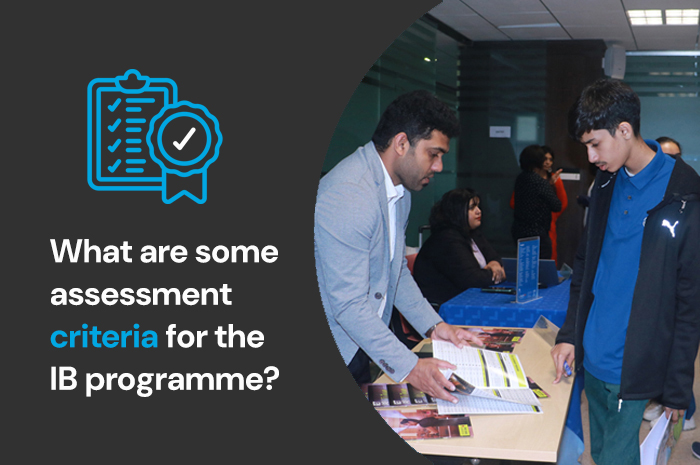What are some assessment criteria for the IB programme? The IB Diploma Programme (IBDP) is expansive. Learners are to choose six subjects from the six subject groups, with at least 3 subjects at Higher Level (HL) and remaining in Standard Level (SL). Learners even have the alternative to choose all courses at HL, though that is not compulsory. For the six subjects, there are internal assessments and external assessments. IB adopts point-based scoring with 7 as the highest point for each subject. The course has a core component worth 3 points in the form of Theory of Knowledge (ToK), Extended Essay (EE), and Creativity, Activity, and Service (CAS). Let us look at the assessment criteria for IBDP through this article.
As mentioned above, learners can score between 1 to 7 points in each of the 6 subjects. Here is a description of the grades as published by IB –
| Grade | Description |
| 1 | Minimal achievement of objectives |
| 2 | The learner has difficulty understanding the subject even with assistance |
| 3 | Limited achievement. Learners can apply the concepts with support, in normal conditions. |
| 4 | Good understanding with occasional evidence of the skills of analysis, synthesis and evaluation. |
| 5 | Thorough and consistent understanding of the subject with the ability to apply them in various situations. |
| 6 | Thorough and consistent understanding of the subject with the ability to apply them in a wide variety of situations. |
| 7 | Thorough and consistent understanding of subjects with the ability to apply them almost faultlessly in a wide variety of situations. |
The core components are assigned letter grades A to E, and the description is
| Grade | Description |
| A | Excellent |
| B | Good |
| C | Satisfactory |
| D | Mediocre |
| E | Elementary |
The final result score is a sum of all individual course scores. Thus, for the six subjects, the highest score is 42 points. 3 points are assigned for EE and ToK, bringing the total score to 45. A learner is awarded the diploma on gaining at least 24/42 points and completing the core courses. When the final scores are calculated, it is calculated out of 45, including the 3 points of EE and ToK.
The IBDP grades can be used to determine -
As per IBO guidelines, a learner receives the diploma certificate if none of the nine conditions mentioned below applies to them -
The IB grades are a reflection of the learner’s understanding of the subject, and also the skills they have acquired over two years. Many of these skills are essential for adjusting to the rigours of college curriculum and courses. Learners cultivate discipline, organisational and time management skills, and research skills. Through the assessments, the examiners are testing the learner’s dedication and involvement in the programme. They are testing if the learner has fulfilled the objectives of developing an international mindset and application of the theories they are learning.
© Knowledgeum
